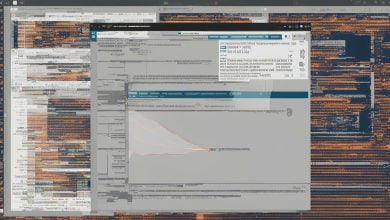
Welcome to our article on boosting code efficiency! As a software developer, you know that writing efficient code is essential for the success of any project. In this article, we will share some tried and tested software development hacks that can help you improve your code efficiency and increase programming productivity. Whether you are a seasoned developer or just starting, these software development tips will undoubtedly help you better understand the concept of code efficiency and optimize your code for maximum performance.
Key Takeaways:
- Efficient code is crucial in software development.
- Software development hacks can help improve code efficiency and boost programming productivity.
- Using code optimization techniques, tools, and frameworks can streamline the development process and enhance efficiency.
- Regular code review, testing, and debugging can ensure code efficiency and quality.
Understanding Code Efficiency and its Impact on Programming Productivity
Efficient code is at the core of successful software development. Writing efficient code can have a significant impact on programming productivity, making it easier to maintain, debug, and scale. Conversely, inefficient code can lead to a host of problems, including reduced performance, increased resource usage, and longer development cycles.
Improving code efficiency is therefore essential for maximizing programming productivity. This involves identifying and eliminating inefficiencies in your code, optimizing algorithms and data structures, and employing best practices for writing efficient code.
By improving code efficiency, you can increase programming productivity, allowing you to develop more robust, scalable, and high-performing software applications. The following sections will cover some tried and tested software development hacks to help you improve code efficiency and streamline the software development process.
Code Optimization Techniques: Proven Strategies for Efficient Coding
Efficient coding practices are essential for software developers looking to create optimized and high-performing applications. By writing efficient code, you can increase program speed, reduce resource usage, and improve overall performance. In this section, we will explore various code optimization techniques that developers can implement to improve code efficiency and enhance software development processes.
1. Use Data Structures Effectively
Data structures play a crucial role in efficient coding. They can significantly impact the time and space complexity of your code. By selecting the appropriate data structure, you can reduce the time required for operations such as searching, inserting, or deleting elements. For example, using hash tables instead of arrays for large datasets can significantly improve search and insert times. Similarly, using priority queues for sorting operations can save time and improve efficiency.
2. Minimize Resource Usage
Resource usage can significantly impact software performance. It’s essential to optimize resource usage to ensure software runs efficiently. One way of minimizing resource usage is by avoiding unnecessary computations. For instance, by precomputing values that are repeatedly used and storing them in cache memory, you can avoid repeating expensive computations.
3. Optimize Algorithms
Optimizing algorithms refers to the process of rethinking the logic of an algorithm to reduce its time complexity. For instance, switching from a linear search to a binary search can significantly improve search time for large datasets. Similarly, using dynamic programming or memoization for recursive algorithms can significantly reduce time complexity and improve efficiency.
By implementing these code optimization techniques, developers can create more efficient and high-performing software. It’s essential to keep in mind that code optimization is an ongoing process, and continuously reviewing and revising code can lead to long-term improvements in performance and efficiency.
Streamlining Processes: Tools and Frameworks for Software Development Efficiency
Efficiency is key in software development, and utilizing the right tools and frameworks can go a long way in optimizing code and increasing software development efficiency. This section will cover some popular tools and frameworks that can help developers boost code performance and streamline the development process.
Integrated Development Environments (IDEs)
An Integrated Development Environment (IDE) is a software application that provides a comprehensive environment for software development. IDEs offer a variety of tools and features that can enhance software development efficiency, including code completion, debugging, and version control. Popular IDEs include Visual Studio, Eclipse, and IntelliJ IDEA.
Code Editors
Code editors are lightweight applications that allow developers to write and edit code. While they lack the comprehensive feature set of an IDE, they are often faster and more customizable. Some popular code editors include Visual Studio Code, Sublime Text, and Atom.
Debugging Tools
Debugging tools help developers identify and resolve issues in their code. These tools can range from simple print statements to advanced debugging applications. Popular debugging tools include GDB, PyCharm, and Xdebug.
Efficient Frameworks
Frameworks are pre-written code libraries that can help developers build applications more efficiently. By providing pre-built functionality for common tasks, frameworks can help developers avoid reinventing the wheel and focus on the unique aspects of their application. Popular frameworks include Django, React, and Angular.
By utilizing the right tools and frameworks, developers can enhance software development efficiency and boost code performance. Take the time to explore different options and find the ones that work best for your workflow.
Code Review and Refactoring: Enhancing Efficiency through Continuous Improvement
Code review and refactoring are essential practices for ensuring code efficiency and improving software development productivity. By regularly reviewing and refactoring code, developers can optimize their code and identify potential issues early on.
The Importance of Code Review
Code review is the process of examining code to identify potential issues or areas for improvement. Code reviews can help developers identify bugs, improve code documentation, and ensure adherence to coding standards. By identifying and addressing efficiency issues early on, code reviews can help prevent more significant problems down the line.
Some key tips for conducting effective code reviews include:
- Setting clear expectations for the review process
- Conducting reviews in a timely manner
- Being thorough and focused on identifying potential issues
- Providing actionable feedback that can help improve code efficiency
- Encouraging discussion and collaboration among team members
The Role of Refactoring
Refactoring is the process of restructuring existing code to improve its quality and efficiency. By refactoring code, developers can simplify complex structures, remove redundant code, and optimize resource usage.
Some best practices for refactoring code include:
- Using automated refactoring tools to identify potential areas for improvement
- Focusing on the most critical parts of the codebase first
- Documenting code changes to maintain clarity and transparency
- Testing refactored code thoroughly to ensure it performs as expected
Regular code reviews and refactoring practices can help enhance efficiency and productivity in software development. By making efficiency a top priority and incorporating these software development hacks into their workflows, developers can optimize their code and deliver high-quality software products.
Testing and Debugging: Ensuring Code Efficiency and Quality
Efficient software development requires thorough testing and debugging to ensure code efficiency and quality. By implementing effective testing methodologies, developers can identify and address potential inefficiencies, reducing resource usage and improving overall efficiency.
One key testing methodology is unit testing, where individual units or components of code are tested to ensure they function as intended. This approach not only helps catch errors early on, but also ensures that each component contributes to the overall efficiency of the code.
Performance testing is another crucial testing methodology, which involves analyzing code execution time and resource usage. This helps identify potential bottlenecks and areas for optimization, ultimately leading to more efficient code.
Debugging tools and techniques are also essential in maintaining code efficiency and quality. By identifying and resolving issues early on, developers can prevent larger problems from arising down the line.
As with all aspects of software development, continuous improvement is key. Regular testing and debugging practices, coupled with ongoing code review and refactoring, can ensure that code remains efficient and optimized over time.
By prioritizing testing and debugging in the software development process, developers can ensure that their code is not only efficient, but also high-quality and reliable.
Conclusion
Boosting code efficiency is a crucial aspect of software development that can have a significant impact on productivity. By implementing tried and tested software development hacks, developers can optimize their code and streamline the development process.
Throughout this article, we have discussed various strategies for improving code efficiency, including code optimization techniques, utilizing efficient frameworks, and implementing regular code review and refactoring practices. Additionally, we have explored the role of testing and debugging in ensuring code efficiency and quality.
As developers, it is important to prioritize code efficiency and continuously seek ways to improve our programming practices. By implementing the tips and techniques discussed in this article, we can enhance our code quality, productivity, and ultimately, the success of our software projects. So, what are you waiting for? Start optimizing your code today!
FAQ
Q: What is code efficiency and why is it important in software development?
A: Code efficiency refers to the ability of a program to execute tasks quickly and effectively while using minimal system resources. It is important in software development because efficient code leads to faster execution, reduced resource usage, and improved overall performance of the software.
Q: What are some code optimization techniques for writing efficient code?
A: Some code optimization techniques include using data structures effectively, minimizing resource usage, and optimizing algorithms. Other strategies include caching frequently used data, removing unnecessary computations, and optimizing loops and conditionals.
Q: How can tools and frameworks enhance software development efficiency?
A: Tools and frameworks can enhance software development efficiency by providing features such as code completion, debugging support, and performance profiling. They can also automate repetitive tasks, facilitate collaboration among team members, and offer libraries and modules that optimize code performance.
Q: Why is code review and refactoring important for code efficiency?
A: Code review helps identify areas for improvement and ensures that code adheres to best practices. Refactoring involves restructuring code to make it more efficient and maintainable. Regular code review and refactoring practices can enhance code efficiency and overall software quality.
Q: How does testing and debugging contribute to code efficiency?
A: Testing and debugging help identify and resolve issues in the code that can impact efficiency. Unit testing ensures that individual components of the code work correctly, while performance testing helps identify bottlenecks and optimize code. Effective debugging techniques help pinpoint and fix efficiency issues.







